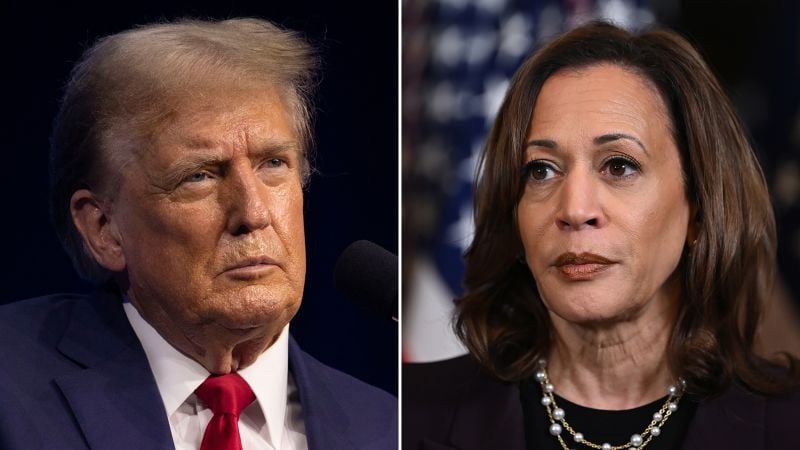Far from being a boring rematch like the initial trend that made many Americans disinterested in politics, the 2024 presidential election promises to have many unpredictable developments.
No one expected President Joe Biden's campaign to collapse in less than a month, from the shock of his performance at the debate in late June to his decision to drop out of the race in late July. Democrats went from confusion to excitement when they selected their new candidate, Vice President Kamala Harris.
No one expected an assassination attempt on former President Donald Trump, an event that united Republicans around him and prompted many in the party to pay tribute to his near-death experience.
So it's impossible to know specifically what will happen in the next 100 days until Election Day, November 5, or what might happen after that, when America's unique Electoral College process begins.

Former US President Donald Trump of the Republican Party and Vice President Kamala Harris of the Democratic Party. Photo: CNN
August: Harris nominated at Democratic convention
The Democrats will need to formally nominate Ms. Harris as the Democratic presidential nominee. Delegates will do so in a short period of time, from August 1 to August 7. Ms. Harris will also need to choose a running mate.
The Democratic Party will hold its convention in Chicago at the end of August. Mr. Biden is expected to be given a grand reception. Democrats have shifted from worrying about his electoral prospects to celebrating him as a hero.
September: Second presidential debate
Biden and Trump had agreed to hold a second debate, hosted by ABC News, on September 10. But with Biden dropping out of the race, Trump has suggested he might not participate in the ABC-sponsored debate. Instead, the Trump campaign has proposed a debate on Fox News, which has proposed a date of September 17.
The first round of early voting will also take place in September. North Carolina was the first state to send out mail-in ballots on September 6. Other states will follow suit in the weeks that follow. Many Americans may start paying more attention to the September election.
October: Voting takes place in many states
Election Day is November 5, but most states allow early voting, either by mail or in person, and the process moves more quickly in October.
Most Americans, nearly 70%, voted early or by mail in 2020, although that number was impacted by the COVID-19 pandemic, according to census data.
The campaigns will focus on rallying voters in a handful of battleground states. In 2020, Mr. Biden won five states that Mr. Trump won in 2016. Those states — Arizona, Georgia, Michigan, Pennsylvania and Wisconsin — could be a focus again in 2024 when Ms. Harris, who turns 60 in October, faces Mr. Trump.
November: Election Day and Beyond
US law requires federal elections to take place on the Tuesday after the first Monday in November. This year, that is November 5.
Those who don’t vote early will go to their local polling place. Polls close at different times across the country. Because of the increase in mail-in voting, we may not know the winner on Election Day.
There is a possibility of lawsuits in some states and recounts in others. Election Day is not the end of the election.
December: Electoral College begins voting
On December 11, the states must resolve any disputes to choose their electors in the Electoral College. On December 17, the electors meet in their respective state capitals to formally vote for president and vice president.
The US Constitution requires that each state appoint a number of electors equal to the number of seats in the US Congress (the number of Senators and Representatives) assigned to that state. The current number of electoral votes is 538.
January: New President Inaugurated
A presidential candidate needs to receive an absolute majority of electoral votes (over half), or 270 or more, to win the presidency. If no candidate receives a majority, a runoff election is held by the new Congress (which takes office on January 3). Specifically, the US House of Representatives will elect the President, while the US Senate will elect the Vice President.
On January 6, the votes are officially counted before a joint session of Congress. The President of the Senate officially announces the election results. On January 20, the next President of the United States will be sworn in.
Ngoc Anh (according to CNN)
Source: https://www.congluan.vn/bau-cu-my-2024-va-nhung-buoc-ngoat-kho-luong-trong-100-ngay-cuoi-post305370.html


![[Photo] Warm meeting between the two First Ladies of the Prime Ministers of Vietnam and Ethiopia with visually impaired students of Nguyen Dinh Chieu School](https://vstatic.vietnam.vn/vietnam/resource/IMAGE/2025/4/17/b1a43ba73eb94fea89034e458154f7ae)
![[Photo] General Secretary To Lam receives French Ambassador to Vietnam Olivier Brochet](https://vstatic.vietnam.vn/vietnam/resource/IMAGE/2025/4/17/49224f0f12e84b66a73b17eb251f7278)
![[Photo] Welcoming ceremony for Chinese Defense Minister and delegation for friendship exchange](https://vstatic.vietnam.vn/vietnam/resource/IMAGE/2025/4/17/fadd533046594e5cacbb28de4c4d5655)
![[Photo] President Luong Cuong receives Kenyan Defense Minister Soipan Tuya](https://vstatic.vietnam.vn/vietnam/resource/IMAGE/2025/4/17/0e7a5185e8144d73af91e67e03567f41)
![[Photo] Promoting friendship, solidarity and cooperation between the armies and people of the two countries](https://vstatic.vietnam.vn/vietnam/resource/IMAGE/2025/4/17/0c4d087864f14092aed77252590b6bae)
![[Photo] Prime Minister Pham Minh Chinh and Ethiopian Prime Minister visit Tran Quoc Pagoda](https://vstatic.vietnam.vn/vietnam/resource/IMAGE/2025/4/17/18ba6e1e73f94a618f5b5e9c1bd364a8)






















































![[Video] Viettel officially puts into operation the largest submarine optical cable line in Vietnam](https://vstatic.vietnam.vn/vietnam/resource/IMAGE/2025/4/17/f19008c6010c4a538cc422cb791ca0a1)




































Comment (0)